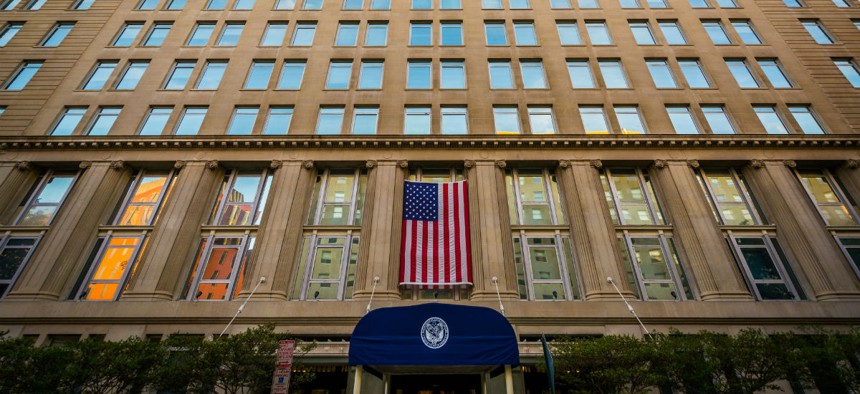
The Department of Veterans Affairs headquarters in Washington.
VA Bonus Dustup, Trump’s Government ‘Accountability’ Play and More
A weekly roundup of pay and benefits news.
Despite a higher than expected pay raise for civilian employees in 2017 and a locality pay boost for some, the new year is likely to be a rocky one for the federal workforce.
President-elect Donald Trump’s announcement that he would tap budget hawk Mick Mulvaney to lead the White House Office of Management and Budget suggests agencies—and possibly feds themselves—are in for some belt tightening next year. The South Carolina Republican is a founding member of the House Freedom Caucus and a longtime proponent of cutting government, including government employees’ benefits.
“With Mick at the head of OMB, my administration is going to make smart choices about America’s budget, bring new accountability to our federal government, and renew the American taxpayer’s trust in how their money is spent,” Trump said in a statement.
If Mulvaney’s past priorities are any guide, expect more hiring freezes and maybe some benefits cuts: In 2011, Mulvaney introduced legislation to cut the federal workforce through attrition. He estimated the legislation, which called for hiring one federal employee to replace every three workers who retire or leave their job, would save $139 billion over a decade. He also sought (unsuccessfully) to eliminate federal employee transit benefits as a way to offset disaster recovery aid following Superstorm Sandy in 2013.
Stay tuned for more coverage of OMB in the Trump/Mulvaney era.
In the meantime, some good things are happening on the veterans benefits front:
- Veterans Affairs Department is doubling its capacity to help veterans in crisis by opening a satellite office of the Veterans Crisis Line in Atlanta. The new center will be able to serve an additional 600 veterans per day, according to the VA. “The addition of the second Veterans Crisis Line facility enhances VA’s ability to provide 24/7 suicide prevention and crisis intervention services by trained, dedicated VA employees to veterans, servicemembers and their families,” said VA Deputy Secretary Sloan Gibson in a statement.
- VA is amending its adjudication regulations to add an additional benefit for veterans with traumatic brain injury as a result of the 2010 Veterans’ Benefits Act. The law ensures additional monthly compensation to provide veterans suffering from TBI with assistance who otherwise would require hospitalization, nursing home care, or other residential institutional care. Previously, veterans with TBI were not eligible for this benefit unless they had a separate service-related disability that qualified under the law.
- President Obama signed the Combat-Injured Veterans Tax Fairness Act, which requires the Pentagon to notify vets of the overpayments and explain how they can file amended tax returns to recover the overcharge. “Our government wrongfully withheld $78 million from thousands of disabled combat veterans over a period of several decades,” said Tom Moore, attorney and manager of the Lawyers Serving Warriors® project at the National Veterans Legal Services Program. Moore discovered the problem. “Thousands of our nation’s disabled veterans are one step closer to receiving a remedy to fix this egregious oversight,” he said.
News for those who actually work at the VA (many of whom are veterans themselves) was less positive this week. House Veterans Affairs Committee Chairman Jeff Miller, R-Fla., rebuffed a request from VA Deputy Secretary Sloan Gibson to repeal “counter-productive” restrictions on awards for department employees included in the Comprehensive Addiction and Recovery Act of 2016.
The restrictions “irrationally impose a worst-in-government employee awards system onto an organization in the midst of transitioning into the best-in-government customer service provider to our nation’s veterans,” Gibson wrote.
Miller denied the request in a letter to Gibson, and issued this unequivocal statement: “Clearly, the judgment of VA leaders is clouded by their continual obsession with cash bonuses, awards and incentives for employees even in the face of the ongoing scandals plaguing the agency. Imagine how much better off the department and our veterans would be if VA leaders spent more time focused on fixing the agency’s many problems rather than appeasing bureaucrats and union bosses.”
Any feds planning to leave government service might consider looking for employment in Washington. The D.C. City Council just passed one of the most generous paid leave laws in the country, to be funded by a new payroll tax. Federal employees who work in the District aren’t eligible, however. As FedSmith notes, the city is prohibited from imposing taxes on the federal government, so federal workers employed in the nation’s capital are exempt.






